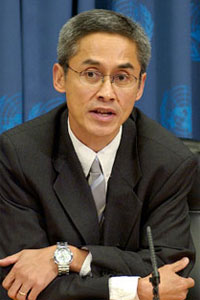
The term "soft power" has seeped into international relations and it is now a catchphrase with its own global momentum. Yet it should be recalled that in the 1980s, it was used to describe the nature of a weaker state confronted by the "hard power" embodied by a stronger state.
The 1990s saw the end of the Cold War, which opened the door to more civic, political and artistic space in many countries. "Soft power" began to mutate -- to project the power of stakeholders beyond the state itself, in particular individuals and groups personifying creativity.
Significantly, "soft power" was propelled especially by South Korea, which began its "K-Pop, K-Wave" ("Hallyu") journey, as the country burgeoned artistically through democracy which became entrenched in the country.
Thailand's position on this issue can be seen via the Global Soft Power Index, evolved by the private sector. One source gives the country a ranking of 41 out of about 120 countries in 2022. The criteria concern "trade, governance, international relations, culture, media, communications, education, and values".
The Thai response has been to devise content through some five linchpins: food, film, fashion, fighting and festival ("the Five Fs"). What, then, is the current situation?
In regard to food, the country's culinary charms took hold decades ago, as Thai cuisine spread exponentially worldwide.
The country is blessed with all kinds of produce and ingredients, due to its status as a food basin. The fame of Thai rice reaches far and wide, as a global ambassador for this land.
Yet the poorest segment of society remains the agricultural community. Recent World Bank data suggest that around 80 per cent of the poor (several million people) are to be found there.
They shoulder massive debts, with current household debt hovering nationally at around 90 per cent of GDP.
Outreach programmes to clear debts, as well as options to access credit without being exploited, coupled with education for self-reliance are obviously desired.
The ageing population will require sensible planning so as to enable agriculture to be sustained, perhaps with more technology.
In a world increasingly preoccupied with ecological concerns, the greenery which agriculture represents acts as an environmental cushion in the face of climate change and global warming.
With regard to films, the country has been producing various appealing series.
A number of "Y or "boy love" (BL) series have captured a global audience. KinnPorsche, the series, was possibly the first Thai series on the internet to tackle gay relations in the context of a mafia setting.
More recently, I Feel You Linger in the Air is possibly the first period piece with gay themes, dating back to a century ago, beautifully acted, edited and packaged.
This series deals not only with boy love but also girl love relations, all too rare in Y series. There are key messages against a patriarchal society and abuse of power.
The music of the series, especially the song Lantom, is exceptional, composed and performed by the group Cocktail (its lead singer is a law graduate!)
Yet there is still much censorship and self-censorship in the country vis-a-vis films and other art forms which touch on political issues or are satirical of key institutions.
Whatever happened to that Thai film about the Thai Macbeth which was banned a decade ago? Shakespeare might be pleased to know that a court case may now be pending to question that ban.
As for fashion, while the country is full of creative talent, a key issue is how to internationalise and market it well to be part of soft power.
One lesson learned from one successful French fashion company is this: the secret is "desirability".
On the other hand, care should be exercised to avoid waste and pollution. The fashion industry should promote "greener" fashion which shuns such regrettable practices as burning unsold goods to keep up prices.
When it comes to "fighting", of course, Thai boxing and related martial arts have a huge global following.
That sport is projected as a traditional practice, muscularly "ripped", with Thai-cum-international ripples. However, there remains a cultural challenge.
At what age should this practice be permitted? The pro-boxing lobby prefers a young age. The current legal situation, from a child labour perspective, is that the minimum age is set at 15 years old.
However, a pro-rights lobby wishes to raise the boxing age to 18 as the minimum age, as the sport can been seen as a harmful practice; the international standard is set at 18 for dangerous work.
Finally, the fifth "F" for "festival" opens many doors to Thailand as a place for rest and leisure, and for a variety of arts to flourish.
The plurality and diversity of local cultural festivals, and their shared wisdom, should be maximised. The advent of international art festivals is welcome.
The various musical events have also become more frequent, especially after the retreat of Covid-19. On this front, a greater variety of festivals can be explored.
On the modern front, digitally-oriented festivals can be a learning tool to deal with emerging technologies.
On the literary front, there is a need for more festivals which encourage people to read, write, discuss, analyse, comment and debate freely and with empathy.
There should also be festivals to deal with environmental protection and health issues, including mental well-being, with the key participation of doctors and nurses who exemplify soft power par excellence through our medical services.
Should "soft power" thus be "legislated" by this government? Lest we forget, there is another "F", the sixth "F", which cries out to be respected, especially in relation to opinion, expression, assembly, association, participation and inclusion: "freedoms", please, "freedoms".
Vitit Muntarbhorn is a Professor Emeritus at the Faculty of Law, Chulalongkorn University. He has helped the UN as UN Special Rapporteur, UN Independent Expert and a member of UN Commissions of Inquiry on Human Rights.
